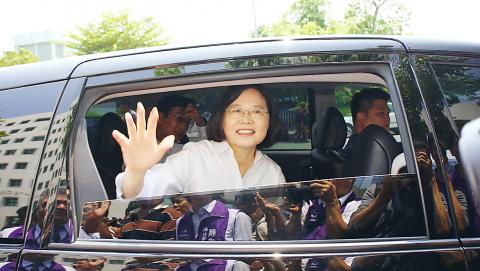Democratic Progressive Party (DPP) presidential candidate Tsai Ing-wen (蔡英文) yesterday criticized the Chinese Nationalist Party’s (KMT) economic policies, describing them as products of an “outdated mindset” that belong to the previous century.
“Taiwan’s economy is stuck in a rut; it is as if someone has hit the ‘pause’ button while watching TV,” Tsai said during a rally in Kaohsiung. “From a macroeconomic perspective, Taiwan failed to achieve even 1 percent GDP growth in the past quarter and the [average] salary is the same as that of 15 years ago. Oveseas relocation of the nation’s industries has also become a major issue; although businesses seem to be making money, the majority of investments, purchases, and employment do not benefit Taiwan anymore, as production facilities have been relocated overseas.”
She said the economy faces an even bigger challenge, as any economic growth that occurs is not equitably shared, and the gap between the rich and poor continues to widen.

Photo: CNA
The cause of the hiatus in growth and economic injustice is the KMT’s outdated mindset when it comes to formulating economic policy, she said.
“The KMT has come up with some policy ideas aimed at lifting the economy, but these proposals would only have worked in the past century, when global demand was strong, profits were high in the manufacturing industry and the export market was strong,” Tsai said. “However it is the 21st century now; the world has changed, but the KMT is still sticking to its antiquated ideas.”
Tsai said the KMT’s anachronistic approach to economic policymaking can be seen in its over-reliance on tax cuts and subsidies and their faith in economic liberalization.
“The fact is that the government does not know what to do, so it does nothing, and leaves everything to the market,” Tsai said. “And it blames the DPP for the problem, saying that the recession has been caused by our opposition to the cross-strait service trade agreement and the free economic pilot zones — do you think that is fair?”
The DPP believes that the key to economic growth is upgrading and transforming the industrial sector and a DPP government would implement policies to attract more investment, encourage businesses to innovate and make sure that the distribution of wealth is fair, she said.
Tsai said that if she is elected, she would invest the majority of the national defense budget into developing domestically produced military hardware and technology, which would encourage growth in related high-tech industries, adding that her proposal to develop domestically built submarines would benefit the ship-building industry in Kaohsiung.

ANOTHER EMERGES: The CWA yesterday said this year’s fourth storm of the typhoon season had formed in the South China Sea, but was not expected to affect Taiwan Tropical Storm Gaemi has intensified slightly as it heads toward Taiwan, where it is expected to affect the country in the coming days, the Central Weather Administration (CWA) said yesterday. As of 8am yesterday, the 120km-radius storm was 800km southeast of Oluanpi (鵝鑾鼻), Taiwan’s southernmost tip, moving at 9kph northwest, the agency said. A sea warning for Gaemi could be issued tonight at the earliest, it said, adding that the storm is projected to be closest to Taiwan on Wednesday or Thursday. Gaemi’s potential effect on Taiwan remains unclear, as that would depend on its direction, radius and intensity, forecasters said. Former Weather Forecast

As COVID-19 cases in Japan have been increasing for 10 consecutive weeks, people should get vaccinated before visiting the nation, the Centers for Disease Control (CDC) said. The centers reported 773 hospitalizations and 124 deaths related to COVID-19 in Taiwan last week. CDC Epidemic Intelligence Center Director Guo Hung-wei (郭宏偉) on Tuesday said the number of weekly COVID-19 cases reported in Japan has been increasing since mid-May and surpassed 55,000 cases from July 8 to July 14. The average number of COVID-19 patients at Japan’s healthcare facilities that week was also 1.39 times that of the week before and KP.3 is the dominant

The Chinese Communist Party’s (CCP) working group for Taiwan-related policies is likely to be upgraded to a committee-level body, a report commissioned by the Mainland Affairs Council (MAC) said. As Chinese President Xi Jinping (習近平) is increasingly likely to upgrade the CCP’s Central Leading Group for Taiwan Affairs, Taiwanese authorities should prepare by researching Xi and the CCP, the report said. At the third plenary session of the 20th Central Committee of the CCP, which ended on Thursday last week, the party set a target of 2029 for the completion of some tasks, meaning that Xi is likely preparing to

US-CHINA TRADE DISPUTE: Despite Beijing’s offer of preferential treatment, the lure of China has dimmed as Taiwanese and international investors move out Japan and the US have become the favored destinations for Taiwanese graduates as China’s attraction has waned over the years, the Ministry of Labor said. According to the ministry’s latest income and employment advisory published this month, 3,215 Taiwanese university graduates from the class of 2020 went to Japan, surpassing for the first time the 2,881 graduates who went to China. A total of 2,300 graduates from the class of 2021 went to the US, compared with the 2,262 who went to China, the document showed. The trend continued for the class of 2023, of whom 1,460 went to Japan, 1,334 went to